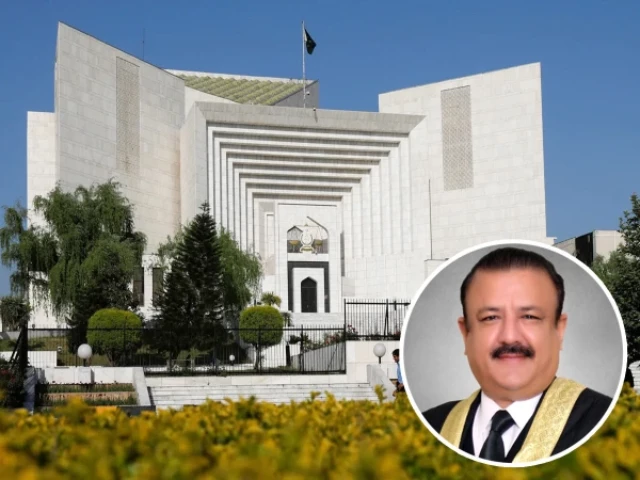The Supreme Court suspended on Monday an order from the High Court of Islamabad which had retained the Tariq Mehmood Jahangiri judge of judicial labor on a case of alleged false diploma.
The case was heard by a constitutional bench of five members led by Judge Amicin Khan and including judges Jamal Khan Mandokhail, Muhammad Ali Mazhar, Hasan Azhar Rizvi and Shahid Bilal Hasan.
Judge Jahangiri appeared before the Supreme Court with four judges from the High Court of Islamabad (IHC) – Mohsin Akhtar Kayani, Babar Sattar, Ejaz Ishaq and Saman Rafat Imtiaz – who all entered the premises by public entry.
Apart from the court, a journalist questioned Jahangiri on the decision of the University of Karachi to cancel his law diploma. “I have already filed a request before the high court of the Sindh,” he replied. “It is amazing that they cancel a diploma after 34 years. It has never happened in world history. ”
The University of Karachi had previously declared the “fictitious” Jahangiri academic file, after its unjust resources committee (UMC) concluded that it had never been registered in Islamia Law College and that it was committed to professional fault during its LLB exams in the 1980s. The KU union approved the conclusions, which have become the basis of a complaint Supreme.
Read: IHC judge struck with a hard blow
During the procedure, judge Mandokhail pointed out that the case before the bench was confined to the provisional order of the IHC. “The meeting of the Supreme Judicial Council is already scheduled for October 18,” he added.
Judge Shahid Bilal asked how a brief request against Jahangiri was numbered despite the objections not resolved by the registrar’s office. “The SC has already judged that a judge cannot be prohibited from working judicial,” said judge Mandokhail.
Judge Jahangiri’s lawyer Muneer A. Malik, argued that a judge cannot be prevented from exercising legal duties while a complaint is pending before the SJC. “This is the first time in history that the own bench of a high short has prevents one of his judges from judicial work,” he said. “The established law has been ignored. The order has not satisfied the requirements of justice. “
Malik added that the petition against his client had been deposited on July 10, 2024 and that she had been pending for more than a year with still unresolved objections.
Find out more: 5 The IHC judges dispute the powers of CJ in SC
“Despite this, a provisional prescription was made without hearing the other side,” he argued. He also pointed out that the same IHC chief judge had previously presided over a bench in the transfer cases of judges, who are still pending before the SC.
Lawyer Mian Dawood, the petitioner, argued that the SC had previously prohibited judge Judge Ali Shah from judicial work. Judge Mazhar replied that the order in this case had been made under article 184, paragraph 3, noting: “The facts were entirely different.”
Malik urged the court to suspend the IHC order to avoid sending “the bad signal”. He stressed that the decision had violated the Malik Asad Ali affair.
At the end of the hearing, following consultations between the Amicin and Mandokhail judges, the Court of Apex suspended the IHC order. Opinions were brought to the Office of the Attorney General, to the Defender General of Islamabad and to other parties. The case was adjourned until Tuesday.
Read also: Judges in the public queue
Earlier, Judge Jahangiri’s challenges before the Sindh High Court were rejected after his advice organized a ranging, the bench calling “very inconcely” driving. This left the Ku cancellation intact at the provincial level.
It can be remembered that on September 16, the CJ of the IHC Sardar Muhammad Sarfraz Dogar led the bench which selected Jahangiri of judicial work. It was the first time in the history of Pakistan that a high court did not prevent his own judge in the delivery of the business – an order that his lawyer called for a blow to judicial independence.
The Islamabad bar council and the district bar association also filed requests to become parties to the case.
Judge Jahangiri described the controversy of “political victimization”, linking it to his role in the letter of the judges of the judges of March 2024 on the supervision of the judges and his work as judge of the electoral court whose decisions had turned upside the candidates for the ruling party.
He insists that the cancellation of a diploma after 34 years is unprecedented in the world and a direct attack on judicial independence.




